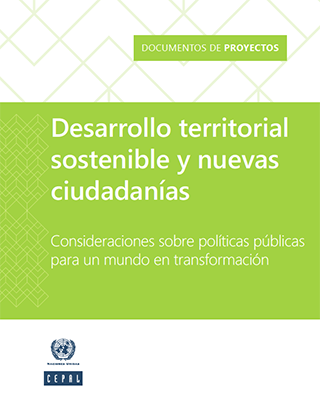- Biblioteca CEPAL
- Biblioguias
- ILPES_en
- Planning for development in the 60 years of ILPES
- Challenges and future development planning
Planning for development in the 60 years of ILPES
Challenges and future development planning
After six decades, ILPES today supports countries in Latin America and the Caribbean in the planning, design and implementation of plans and public policies that reduce structural gaps and inequalities, and to foster a more territorially balanced style of development supported by robust citizen participation, with equality at its foundation and sustainability as an achievable goal.
Constructing this new development pattern, which overcomes the imbalances of its predecessor, requires renewed, collaborative, and participatory leaderships, together with anticipatory governance that uses the construction of possible futures as a vehicle for inclusive and participatory reflection, and a territorial approach that harnesses local specifics and capacities to achieve synergetic and virtuous production linkages. It also requires long-term planning to link short- and medium-term measures with a consensus-based vision of the country, and the forging of pacts between the government and all social actors in the locality in question. Likewise, a mainstreaming of climate action and risk management as axes of planning for resilience.
The multiple crises facing our countries and the challenges of the future, call for profound changes in how State institutions work, so that it may enable new partnerships among diverse and varied actors in public life and strengthen democracy. The COVID-19 pandemic has underscored the critical role of the State as guarantor of the common good and the need for more resilient institutions with the capacity to anticipate, prepare for and respond to crises, and to learn from the successes and failures of decision-making. The common challenges facing nations today also call for strengthened regional integration and cooperation and stronger multilateral planning to address common challenges and safeguard regional public goods. Citizen confidence in democratic institutions must be rebuilt so that citizens participate more to collaborate in the solution of public problems, as well as to dialogue and work together in the construction of the social contracts fundamental in reaching agreement on the structural changes needed to achieve a transformative recovery.
State and open government policies and digital government underpin the imminent changes in State functioning while also being enablers and multipliers for accelerated action towards the Sustainable Development Goals. Even more important is the cultural change that these policies imply, namely placing citizens at the centre of a new public service, and providing access to information, citizen participation and transparency, and empowering accountability.
ILPES’ work aims to make a substantive contribution to this reflection and discussion on what kind of institutional capacity and leadership building is needed to regain the trust of citizens and build lasting and sustainable covenants. ILPES thus seeks to support the countries of the region in strengthening institutional capacities through formation, technical cooperation, networking, and applied studies, and through its knowledge management instruments, such as the Regional Observatory for Development Planning.
Featured publications
-
Estado abierto y gestión pública: el papel del sector académico by
Call Number: LC/PUB.2023/24-PPublication Date: 2024
-
 Desarrollo territorial sostenible y nuevas ciudadanías: consideraciones sobre políticas públicas para un mundo en transformación
by
Call Number: LC/TS.2020/180Publication Date: 2021-01
Desarrollo territorial sostenible y nuevas ciudadanías: consideraciones sobre políticas públicas para un mundo en transformación
by
Call Number: LC/TS.2020/180Publication Date: 2021-01
